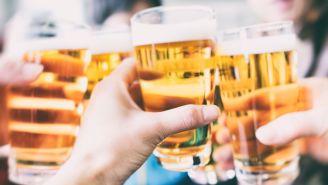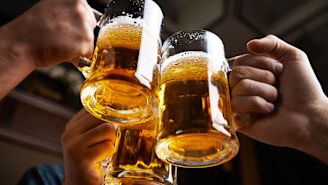Updated on October 8, 2024.
Despite growing awareness about the dangers of alcohol consumption, drinking to excess is often still portrayed in media is harmless, or even glamorous or humorous.
“As a society, we tend to think it’s cool and funny to binge drink, and it’s a culture that gets passed down to our youth,” says Deidra Ward, LCSW, LAC, a therapist and addiction counselor based in Englewood, Colorado. What movies and television shows don’t show, Ward notes, is waking up in a detox center not remembering what you did, how you got there, or where your belongings are.
In reality, binge drinking can lead to serious consequences. These may include sexually transmitted infections, car accidents, and even certain types of cancer.
In her practice, Ward works with patients of all ages to help them tame their drinking habits. She recognizes that binge drinking is a major issue and advocates for better education around the topic. Here’s what to know about the consequences of binge drinking, who is most likely to do it, and what to do if you or someone you know binge drinks.
What is binge drinking?
Binge drinking, according to the National Institute on Alcohol Abuse and Alcoholism (NIAAA), is a pattern of drinking that causes a person’s blood alcohol concentration (BAC) to reach 0.08. (BAC refers to how much alcohol is in the bloodstream. Having a BAC of 0.08 percent means your blood is 0.08 percent alcohol by volume.)
For women and people assigned female at birth (AFAB), a BAC of 0.08 is typically reached after consuming four or more drinks in two hours. For men and people assigned male at birth (AMAB), this typically happens after five or more drinks within two hours.
What are the signs of binge drinking?
Typical signs of binge drinking include:
- Drinking more than you planned to drink
- Uncontrollable drinking
- Blackouts or gaps in memory while drinking
- Violent behavior such as driving drunk, fighting, or sexual abuse
Because they may not drink every day, many binge drinkers are unaware that they have a problem.
“I hear a lot of patients say, ‘I’m not an alcoholic, I don’t do it every day, I only drink in the morning after a hard night, just to help even myself out,’” Ward says. “Responses like that indicate that someone’s body is showing signs of dependence, and that they’re possibly going through active withdrawal.”
Alcohol dependence is a medical condition in which a person has difficulty stopping or controlling how much alcohol they drink. It’s also known as alcoholism or alcohol use disorder (AUD).
Many people get hangovers from binge drinking. Having hangovers means you’re experiencing withdrawal from alcohol and that’s a problem, Ward adds. (Alcohol withdrawal may happen if a person who drinks heavily stops or significantly reduces their intake.)
Binge drinking is a major problem with young people
Overall, roughly one in six (or 17 percent) of adults in the United States binge drinks. But Ward is very concerned about the number of young people, especially on college campuses, who binge drink on a regular basis.
In fact, among full-time college students ages 18 to 22, nearly 29 percent engaged in binge drinking in the previous month, according to the 2022 National Survey on Drug Use and Health (NSDUH). Men are twice as likely to binge drink as women.
“Most adults moderately drink on social occasions, and most are able to weigh the pros and cons of drinking,” says Ward. “Adolescents and young adults, on the other hand, may not understand what alcohol does to their bodies.”
Many college students think they don’t have limitations, says Ward. But regardless of what you may think or tell yourself, your body has a limit. “If you push it over the limit by binge drinking,” Ward says, “it will revolt and you’ll have problems.”
Pregnant people who drink are another concern, says Ward. Roughly one in seven pregnant people in the U.S. drink alcohol and one in 20 report binge drinking, according to the Centers for Disease Control and Prevention (CDC).
Drinking any amount of alcohol during pregnancy increases the risk of brain damage and other congenital differences in babies, including physical, cognitive, and behavioral disabilities. Those risks, also known as fetal alcohol spectrum disorders (FASD), are compounded by binge drinking.
The health effects of binge drinking can last a lifetime
It’s important to look at how much you’re drinking when you do drink. “One bad night or one bad decision can have damaging, lifelong consequences,” says Ward.
Binge drinking can affect you mentally, physically, and emotionally. In some instances, the effects are directly related to drinking. Some of the consequences of binge drinking include:
- Injuries, including car accidents, falls, alcohol poisoning, and even death
- Types of violence, including sexual violence, domestic violence, and suicide
- Sexually transmitted infections, like chlamydia and gonorrhea
- Unplanned pregnancy, miscarriage, pre-term labor, or stillbirth
- Fetal alcohol spectrum disorders
- Heart problems such as hypertension, stroke, and heart disease
- Liver disease
- Cancers of the breast, colon, liver, esophagus, liver, throat, or mouth
- Issues with memory and learning
- Alcohol use disorder
Education about drinking is key
“There is so much work to be done,” says Ward. “Binge drinking is alcohol abuse and it should be treated as such.” The most important thing to help prevent binge drinking is to educate young people, she adds.
“We need teachers and guidance counselors who are trained in substance abuse talking about it. We shouldn’t just tell kids not to do it, we should teach them how not to do it.”
Ward says teaching young people means explaining to them what their brain will go through when they binge drink and describing other ways to fill their time.
How to address binge drinking
It’s important to be open-minded about treatment options for binge drinking and alcohol use disorder, says Ward. To help yourself or someone you know, Ward recommends these steps:
Acknowledge the problem
If your child is binge drinking, it’s best to talk to them about it.
“Many parents say they don’t know what to say, so they don’t say anything,” says Ward. Let them know you want to have an open dialogue about it, that it’s not okay to drink to excess, and that there are repercussions. It’s important to set a good example for your kids, too. If you don’t want them binge drinking, you shouldn’t either.
If you’re a binge drinker yourself and you’ve recognized that you drink too much when you do drink, reach out to a healthcare provider (HCP) to get help. And if a friend or family member talks with you about binge drinking, try to listen to them with an open mind.
Ask questions
When Ward is meeting with a patient who may or may not have admitted they have a problem, she asks them questions, but she tries not to trigger defensiveness.
“We ask questions to provoke dialogue, open-ended questions like what do they get out of binge drinking, what is it like for them, why do they consider it fun, where do they socialize, who do they associate with, and do these friends ever say their drinking is problematic?”
You can ask your child, friend, loved one, or even yourself these questions if you think there is a problem. Asking these types of questions will help them think about the reasons they binge drink and how it makes them feel. This, in in turn, can help them realize how serious the issue is.
Don’t be afraid of treatment
“There’s a stigma around alcohol dependence and that’s why it’s underreported,” says Ward.
In addition to being afraid of the problem, many people think that an HCP is going to tell them they have to give up alcohol and they are an alcoholic. But a professional who is trained in substance abuse disorders is going to evaluate all aspects of a patients’ life. Contributing factors, such as exposure to trauma, environmental stress, and medical factors typically play a role in accurately diagnosing a patient, says Ward.
“Many people don’t know that total abstinence is not always necessary,” Ward says. “You might just need to give it up temporarily and work on mental health issues that could be contributing to a desire to self-medicate.”
Ward says that when you’re looking for a professional counselor, it’s important to find a specialist who is trained to help those with substance use. Reach out to your primary care physician first or connect with the Substance Abuse and Mental Health Services Administration (SAMHSA) helpline at 1-800-662-4357 to find a specialist in your area.
Treatment options may include talk therapy, medications, support groups, residential rehabilitation programs (also known as “rehab”), 12-step programs—or some combination of these approaches.
Avoiding treatment can lead to alcohol use disorder, which can make the consequences worse. If you or someone you know has a binge drinking problem, know that treatment works—and can help you get back to living your healthiest life.







